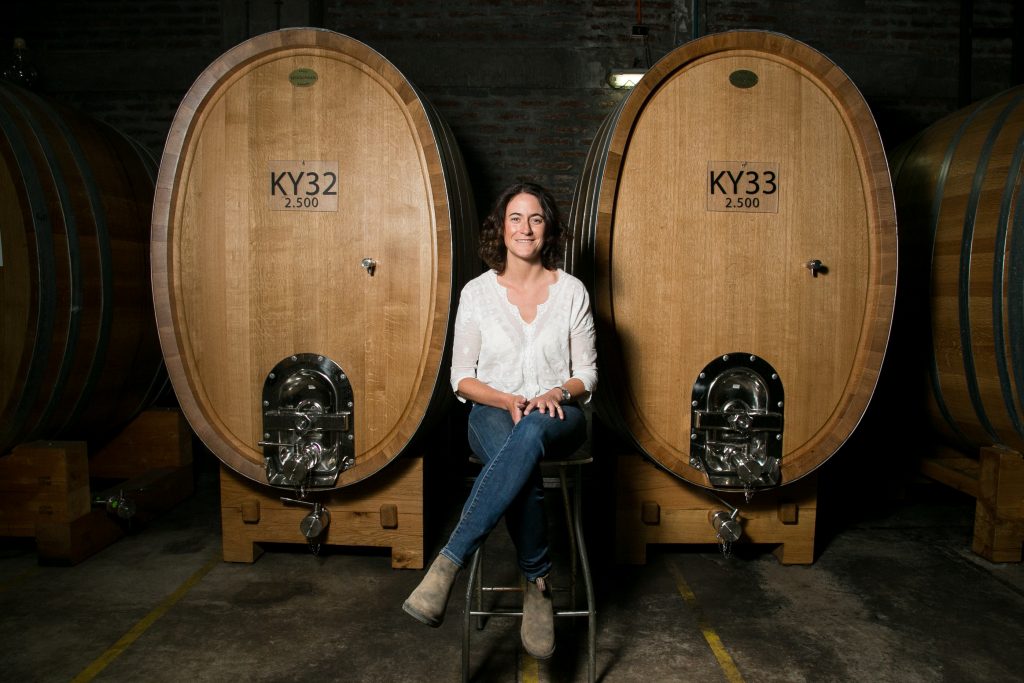This website uses cookies so that we can provide you with the best user experience possible. Cookie information is stored in your browser and performs functions such as recognising you when you return to our website and helping our team to understand which sections of the website you find most interesting and useful.
A glass of wine with Viña Carmen’s Emily Faulconer
We caught up with Emily Faulconer, chief winemaker at Chilean producer Viña Carmen, to find out what International Women’s Day means to her and how she plans to celebrate with her team.

Emily Faulconer is a force of nature. She joined Viña Carmen in 2017, coming to the winery from her previous role as chief winemaker for Viña Arboleda in Chile’s Aconcagua Valley. Prior to this, Faulconer, 37, had worked at famous Napa winery Cakebread Cellars, and at Trinity Hill in New Zealand, as well as Château Canon in Bordeaux.
Faulconer was chosen as one of the ‘top 100 young leaders’ of Chile by El Mercurio, arguably the country’s most influential newspaper in December 2017. The publication credited Faulconer for making premium wines “with their own identity” and for “rescuing the value of the terroir they come from”. In 2018, she was highlighted by Tim Atkin as being one of the brightest rising stars to watch in the world of wine.
Today, the winemaker is making a name for herself as one of the globe’s fiercest champions of Cabernet Sauvignon, leading intensive R&D missions to explore the largely untapped potential of one particular corner of the Maipo Valley, known as Alto Jahuel.
Hi Emily. What was it that first made you want to join the wine industry?
To make wine in Chile you have to study agronomy and, more than just making wine, this career relates to the countryside, to places and to landscapes, with an agricultural product that is very linked to traditions and people. It captured me completely, and became fundamental in my life. Wine is something that brings people together.
How will you be celebrating International Women’s Day?
We celebrate it at Viña Carmen with the whole team. We sit down and share experiences of women that work in different areas of the business, where we come from and what we have achieved. Our main objective is to encourage women to stand out in whichever aspect they decide to. For me, it’s a good opportunity to stop and observe where we stand as women in society, how we have moved forward each year and how we can keep progressing. Obviously, we finish with a good glass of wine.
What does diversity and inclusion mean to you?
It’s about understanding, accepting and valuing how people are different. A diverse team brings results that are definitely more interesting and complete, and when there’s a sense of fair play and belonging it’s much easier to achieve that. When a team has all those elements in place, you can compare it to a good wine, full of layers that make it complex, intriguing and revealing.
Tell us about your winery…
Founded in 1850 by Christian Lanz, Viña Carmen is the first Chilean winery, and it was named in honour of Christian’s wife, Carmen. It’s a truly pioneering brand that has remained current by constantly reinventing itself through its wines. Milestones include the rediscovery of the thought-to-be-extinct Carmenère variety in our vineyards in 1994, a breakthrough that affected not just the Chilean wine industry but the global world of wine. In 2011, we also achieved accreditation under the Chilean National Sustainability Code, which has been re-certified every two years since. Today, Viña Carmen wines are available in 50 markets around the world.
What are your favourite wines that you produce?
Carmen’s Grand Vin is Carmen Gold, a very special Cabernet Sauvignon sourced from Alto Jahuel in the Alto Maipo Valley. The vineyard was planted in 1957 with a masal selection, and produces a balanced Cabernet that is traditional in style, but above all, has a unique elegance. I like to think of it as the reinvention of a classic.
What would you say your winemaking philosophy is?
As winemakers, we interpret the character of places. I believe in a respectful management of the vineyard and low intervention winemaking.
Are you working on any exciting or unique projects at the moment?
In wine, there are so many factors involved, that it is very difficult (or impossible) not to be unique. One of our most important projects at the moment is the work we are doing with Cabernet Sauvignon in Alto Jahuel. We are still discovering the fantastic terroir and resources we have there for this variety and to better our understanding we are carrying out a number of microvinifications, where we evaluate the effect of altitude, exposure, soil type, geology, plant material, etc. Our portfolio of wines shows widely different interpretations of our Cabernet Sauvignons, and I feel we have an interesting and exciting road ahead of us with this variety.

